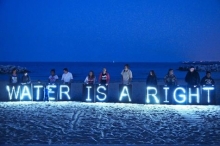PSI addresses UN/World Bank high level panel on water

During the Stockholm Water Week at the end of August 2016, PSI DGS David Boys was invited to meet the Sherpas for the UN-World Bank High-Level Panel on Water (HLPW).[i] The heads of state are supposed to provide impetus to reaching the Sustainable Development Goal 6, meaning universal access to water and sanitation by 2030.[ii]
Our core concern is that the HLPW will advance the privatisation agenda that failed under UNSGAB. Mexican President Peña Neto is clearly in favour of the privateers, and his government is doing his best to advance that agenda throughout Mexico (the resistance is growing, but that is another story). Our union in Mauritius is also concerned that their government is advancing the same agenda.
PSI worked with our allies in the water movement to send clear messages to the HLPW. The attached message was delivered to their Sherpas during a side event at the UN during the High Level Political Forum in July 2016.
In Stockholm, PSI DGS David Boys added :
PSI represents the majority of public water operators in 150 countries. Without a well-trained workforce (key to developing and implementing long-term plans within their utilities) we will never reach the SDG 6.
We welcome the analysis of the World Water Development Report, Water and Jobs, which shows that 75% of jobs are directly and indirectly dependent on water.
Our members work in the public, largely municipal operators which deliver 90% of wat/san services, but these municipal utilities get very little systematic support. Geo-political boundaries blocks systematic use of public-public partnerships (PUPs). There is massive potential of twinning at low-cost. Can we ask the donors and IFIs to put at least as much energy supporting PUPs as you do on PPPs? It is much cheaper than bringing in the high-priced consultants from Deloitte or Price Waterhouse, and there will be no threat of leveraged buyouts or hostile takeovers, let alone ROI of 25% per year.
On finance :
Tax justice is key – if you don’t have your tax system right, you won’t solve your core public service problems. If we don’t ensure regular and predictable finance, especially for municipal, then we have structural problems.
Relying on private finance and PPPs won’t work. Commercial return on investment (ROI) is problematic, especially as it is based on risk adjusted rates of return, with capital flight… they will insist on 20-25% profit per year and take it out of the water system, and likely out of the country.
We recently saw the entry of Blackstone, the world’s largest private equity group, into the water sector, with their company Global Water Development. The Blackstone model, which sees the owner put $8 billion in his own pockets, is not one we need in the water sector.
Christine Calumet from Eau de Paris told the HLPW :
We echo the analysis from PSI. We ask that you consider the growing trend of remunicipalisation. Eau de Paris was remunicipalised in 2010, after 25 years under private management. As a public utility, we are better able to focus on the common good, to bring back water ethics in our governance – as opposed to maximising profits and shareholder returns. We provide better service at lower price.
Paris is ready to twin with other utilities, but we can’t do it all on our own – we need the international system to support municipal twinning.
[i] Composed of ten heads of state from Mauritius and Mexico (the two co-chairs), Australia, Bangladesh, Hungary, Jordan, the Netherlands, South Africa, Senegal and Tajikistan and supported by a former prime minister of South Korea and a former environment minister from Peru, as well as staff from the World Bank and the UN Department of Economic and Social Affairs (UN DESA). https://sustainabledevelopment.un.org/topics/waterandsanitation/hlpw
[ii] The idea for convening the HLPW came from deliberations in the UN SG’s Advisory Board on Water and Sanitation (UNSGAB) which was focused on the MDGs, and which came to term in 2015. The reasoning is that the water and sanitation (wat/san) sector suffers from lack of political visibility and priority – even though it is fundamental to life. Pipes, toilets and sewers don’t have the appeal of other public infrastructure. Thus, the heads of state will be better able to raise the profile of wat/san in the UN system, and through their own examples.

